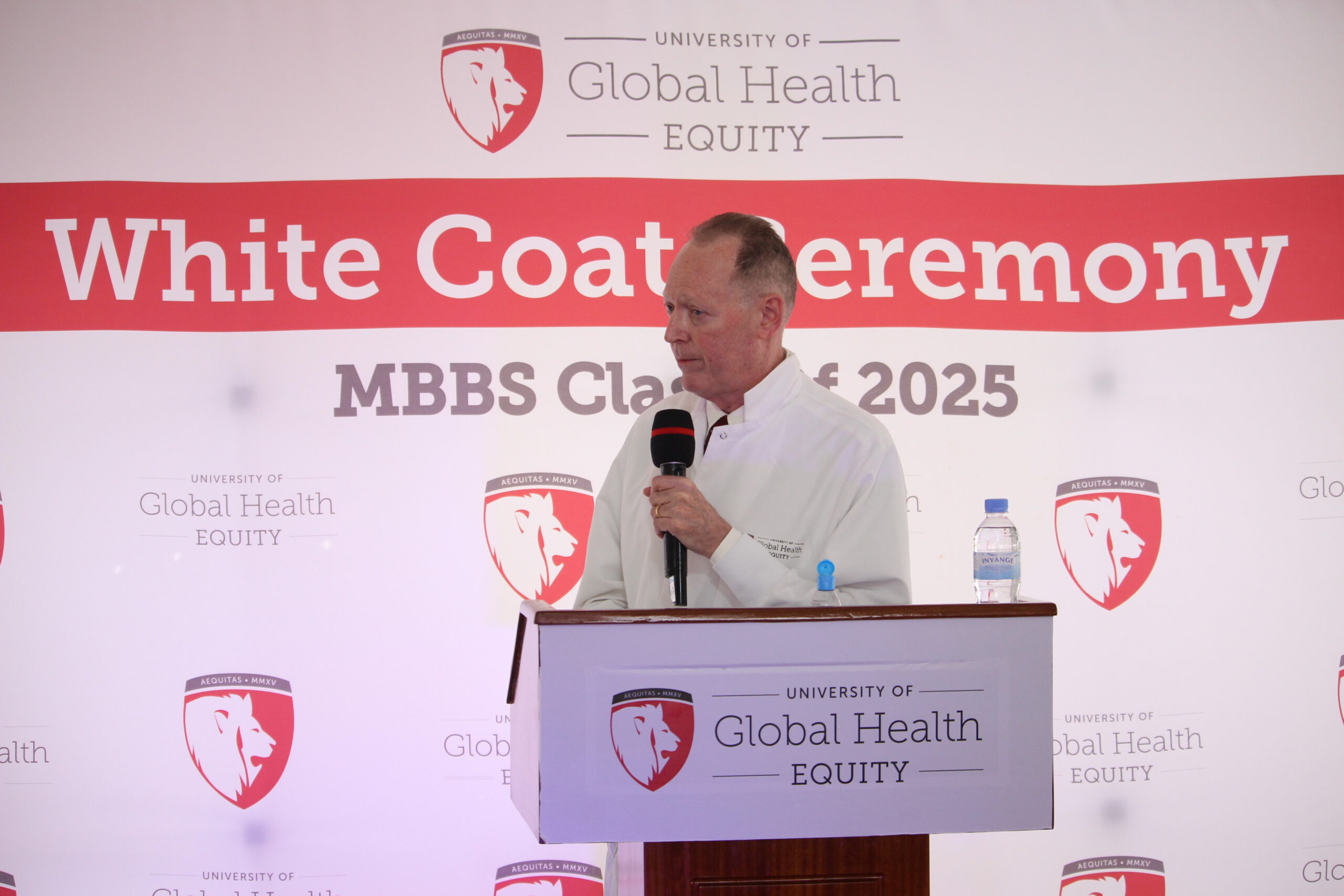Cover photo courtesy of UGHE
Editor’s Note: The late Dr. Paul Farmer and his colleagues pioneered novel, community-based treatment strategies that demonstrate the delivery of high-quality health care in resource-poor settings. Dr. Farmer died on February 21, 2022, in Butero, Rwanda, where he was teaching at the University of Global Health Equity (UGHE). In this piece, three of his colleagues and fellows from UGHE write about the legacy that Farmer created and leaves behind in Africa’s global health policy space.
“If access to health care is considered a human right, who is considered human enough to have that right?”… “The idea that some lives matter less is the root of all that is wrong with the world.”
Dr. Paul Farmer
Every once in a while, a person comes along on the stage of history to challenge the status quo and prick the conscience of the passive. Most people will come and go, but some people will leave having laid the foundations for generational revelation, convictions, and actions. The late Dr. Paul Farmer was one such gift to the world of African Global Health policy and practice. Dr. Farmer straddled the line between passionate individual patient care and health systems strengthening.
One might catch him quietly sitting at the bedside of a Rwandan patient with tuberculosis of the lungs, going for “social rounds” at the hospital late at night on a Friday evening, embracing an HIV+ patient with multi-drug resistant tuberculosis, or enjoying a Liverpool match at the University of Global Health Equity (UGHE) with a patient afflicted by an incurable disease. It was clear to anyone who knew him: he felt most alive when he was helping people.2
Farmer seemed able to envision with accuracy the restoration and future of an African country’s health system, whether ravaged by war or epidemic.3,4 He could switch from international grand rounds to a district hospital ward round with the same pithy, sometimes even private and intimate, humor and zest. Truly, Paul Farmer left us the keys to social justice, the map to global health equity, and the will to carry on his legacy.
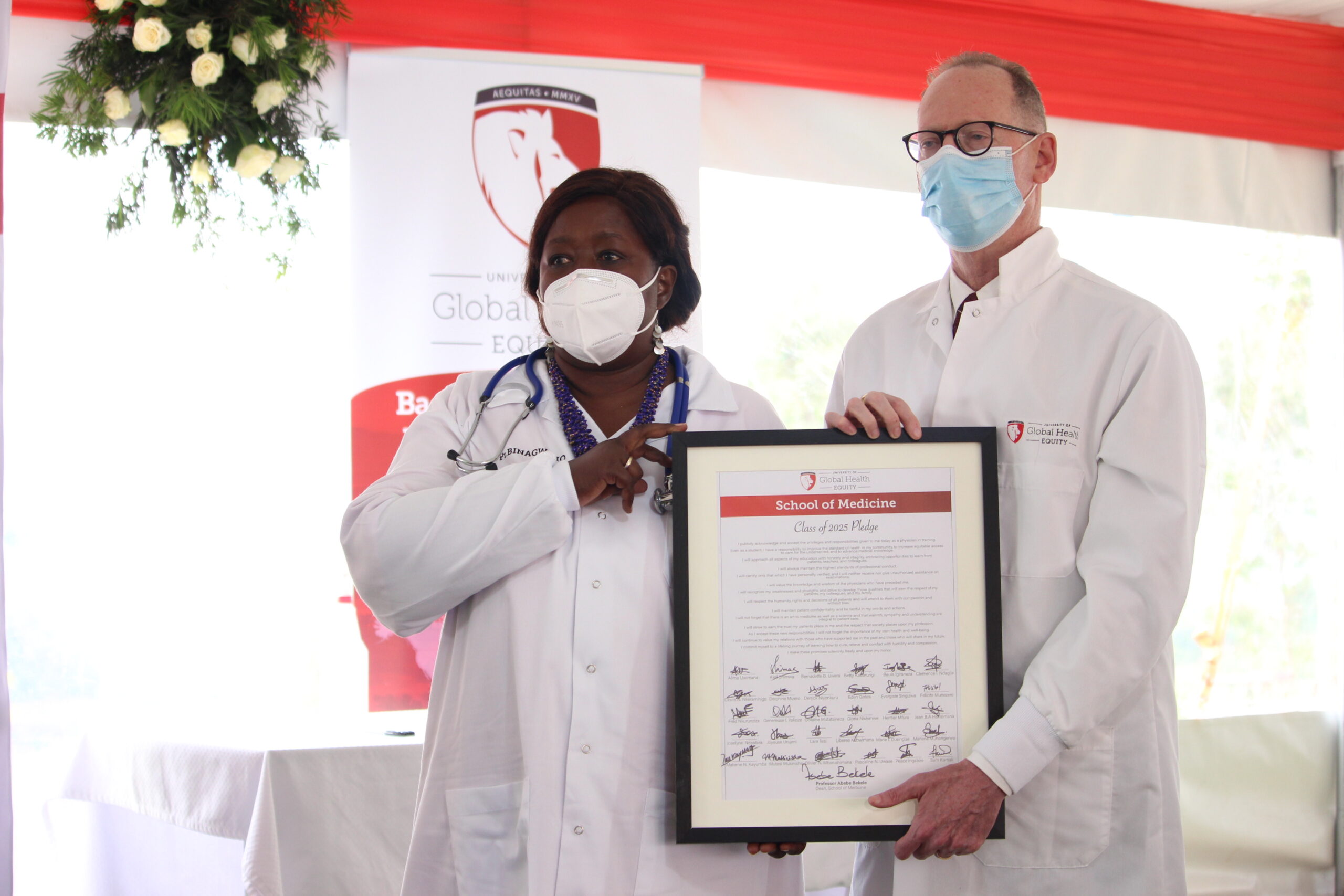
The Farmer Philosophy and the Building of African Health Systems
Politically remarkable thought patterns undergirded all of Farmer’s efforts in and impact on African health policy.5 Inspired by Latin American Roman Catholic Liberation theology thought from the late 20th century — crystallized in the writings of Fr. Gustavo Gutiérrez6 — Farmer embraced accompaniment of the poor and a practical participation in pragmatic solidarity. Liberation theology teaches that God speaks particularly through the poor and that the Bible can only be understood by observing the world from the perspective of the poor.7
Farmer also patented a human-rights-based approach to health.8 Perhaps to the angst of established and resistant systems, he promoted the idea that health is a human right – not just as a philosophical idea, but as a practical, ongoing and realistic pursuit.9 He insisted that, “the idea that some lives matter less is the root of all that is wrong with the world”.2 This led to the upheaval of the HIV/AIDS treatment movement during which he and his colleagues joined in the fight to bring HIV medications to Africa against popular academic and pharmaceutical company opinions.10,11 Despite the fact that physicians were figuratively seeing HIV patients rising from their deathbeds with the advent of retroviral therapy, medication for Southern Africa and Latin America was said to be “too expensive”, “not sustainable”, “lacking data”, or “not feasible.” 12 Treatment was not thought to be an option for impoverished communities, rather they were told to focus on prevention.
This policy mindset left many without treatment in Africa. After a long and fierce struggle between the HIV Equity Initiative, co-championed by Farmer in 1998, and the tradition and policies that ensured that patients in Low and Middle Income Countries (LMICs) could not be treated for HIV, the HIV Equity Initiative won. Gains started in rural Haiti and have spread to Africa, and indeed globally, through the work of Partners in Health. HIV/AIDS financing became a Trojan horse of sorts to battle the disease and poverty cycle, as he emphasized social support through feeding, housing, financial assistance, and accompaniment using funding for HIV care. Farmer led a team that harnessed the funds for HIV care to strengthen health systems — with an emphasis on primary health care.13
Paul Farmer’s ethos was to work in partnership with public sector institutions to strengthen health systems. The Butaro, Kirehe, and Rinkwavu District Hospitals — all Ministry of Health hospitals supported by Partners in Health in rural Rwanda — are examples of this conviction. Farmer contributed significantly to the rebuilding of Rwanda’s health care following the Rwandan genocide14 , and the strengthening of Sierra Leone’s neglected health system as evidence of what can be done.2,4,14 Where no one else wanted to go, Farmer seemed itchy to step in with a “diagonal approach”.2,4
Vertical missions — which consist of dumping cash into programs, outreaches and intervention events — based on African poster-child photographs and touching social media posts, may make donors and visiting healthcare workers feel good but are not enough to grow a sustainable health system. Farmer believed in redirecting vertically oriented funds towards strengthening systems using a horizontal and integrated approach — building self-sustaining institutions, developing local expertise on the ground, and working through indigenous populations and structures — as evidenced by the work he co-founded: Partners In Health (PIH).
Dr. Farmer was particularly passionate about strengthening health services essential for epidemic and pandemic response. He was one of the first responders to the Ebola outbreak in West Africa, and he championed the marriage of public health to individual humanistic medical care. In response to the recurrent tendency of governments elevating containing of outbreaks over treating those affected, his ethos was that Ebola and other pandemic response must be about care, and not just containment. He insisted that “Every time we say, ‘a public health emergency’, it should mean it’s a clinical emergency.”4,15
His driving force was a contagious realization that African health systems required strengthening both to deliver care and simultaneously support prevention of epidemics, pandemics, cancer, and other non-communicable diseases. In reference to the root causes of poor control of Ebola in Africa, he frequently asked UGHE students, “How many medical schools did the British build in Sierra Leone in over 150 years of colonial rule?” His point that was that current defects in health systems and health policy for countries in sub-Saharan Africa could be traced to colonial and neo-colonial foundations. His book Fevers, Feuds, and Diamonds emphasizes his frustration with the fact that Ebola could kill up to 70% of Sierra Leoneans, and clinical protocols insisted on a 99.9% chance of death for African pregnant women, while virtually every American evacuated for Ebola care survived.4 In defiance to the grim posters present throughout Sierra Leone, Guinea, and Liberia focused on “bushmeat”16 , Dr. Farmer rebuffed the scientific errors around Ebola, especially those that blamed the epidemic on perceived cultural and personal deficiencies, and he defined a vision for driving Ebola survival up to 90% for each patient in less than one year as early as 2014.4 He established the first UGHE medical school in Rwanda to train African healthcare leaders and to invigorate such a vision of equity in health care delivery on the continent. He further envisioned UGHE branches in every country where PIH had a presence, including Sierra Leone. He saw, lived, and believed beyond his time.
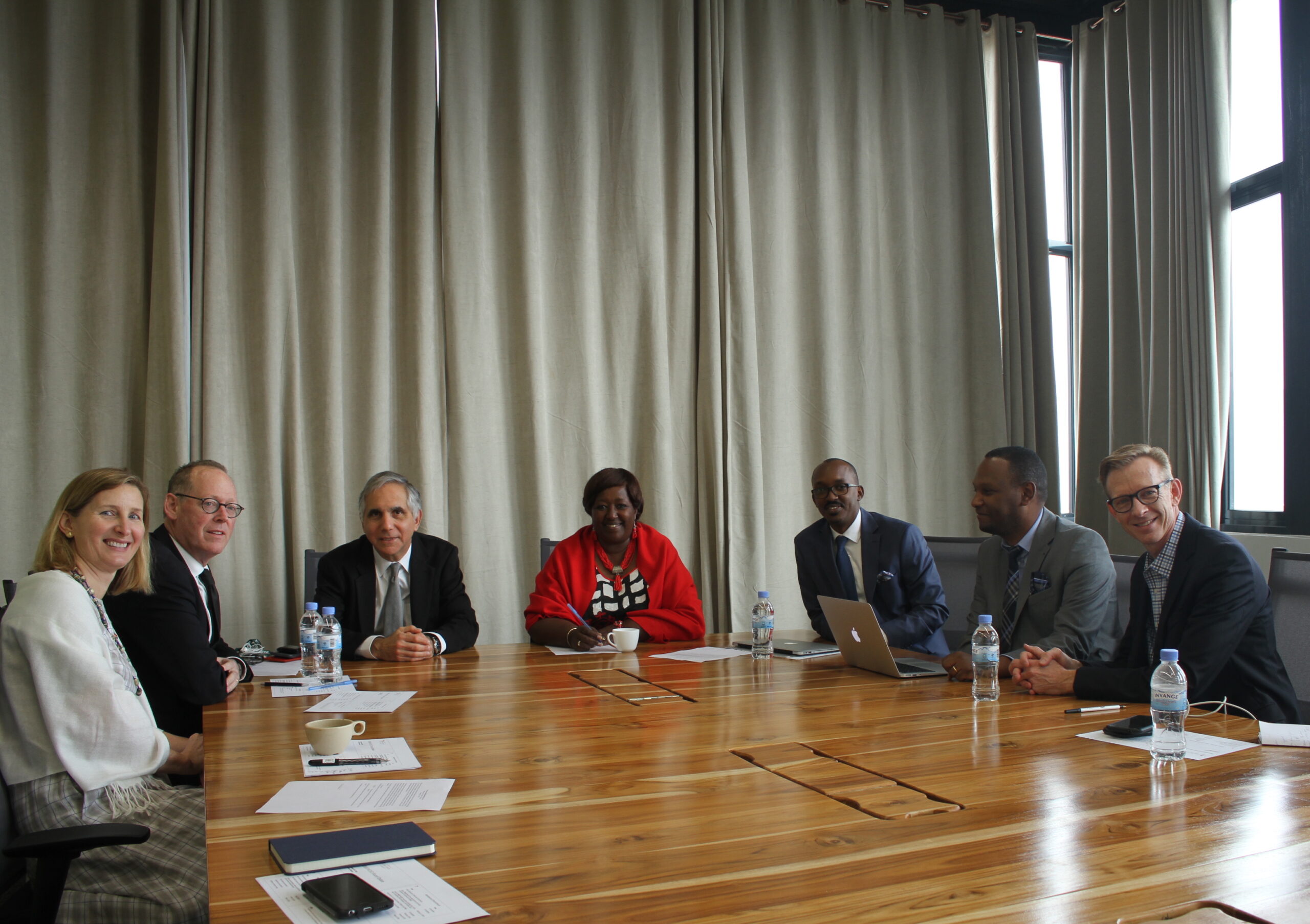
The Farmer Commitment and Catalyst for African Global Surgery
Although Dr. Farmer was an infectious disease expert, he played a critical role in the Global Surgery Movement. He catalyzed the movement with his seminal editorial, ‘Surgery and Global Health: A view from beyond the OR’.17 He was an active commissioner on the Lancet Commission in Global Surgery,18 which led to the establishment of the National Surgical Obstetrics and Anesthesia Plan as a major health policy movement, first implemented in Africa (Zambia, Ethiopia, Tanzania, Rwanda, and the SADC region).19 Speaking at the White Coat ceremony of the inaugural class of UGHE medical students on December 8, 2021, with his characteristic wit, he feigned irritation at the fact that almost all the medical students planned to become surgeons: “We might as well rename this institution to be the ‘University of Cardiothoracic Surgery Health Equity’ — I don’t mind!” he quipped.
In recognition of his commitment for surgery to be properly integrated into the global health agenda, the Paul Farmer Program in Global Surgery and Social Change, based out of the Harvard Medical School, was named after him.20 Over 112 Farmer fellows and research associates across the globe — many of whom are working to build up African surgical systems — have been developed in the space Paul inspired. A couple of weeks before his passing, he told the story, again, of how he and Dr. John Meara went out for dinner on the day that he was told a global surgery fellowship would be named after him. “I turned deep red, and said, ‘John, but I’m not dead yet!’”
He lived to care, and he died caring. He spent the last few weeks of his life with us at the Center for Excellence in Cancer Care, Butaro District Hospital, starting up the Center for Equity in Global Surgery, and inspiring young medical students at the University of Global Health Equity. In the week before he passed, he called to say he would like to spend more time with students during their surgical postings in their clinical Morning Report and lectures.
This was Paul: he loved African medical students because he believed they were an integral part of his “retirement plan.” This was part of his investment in global surgery; staff, stuff, space, systems, and social support.
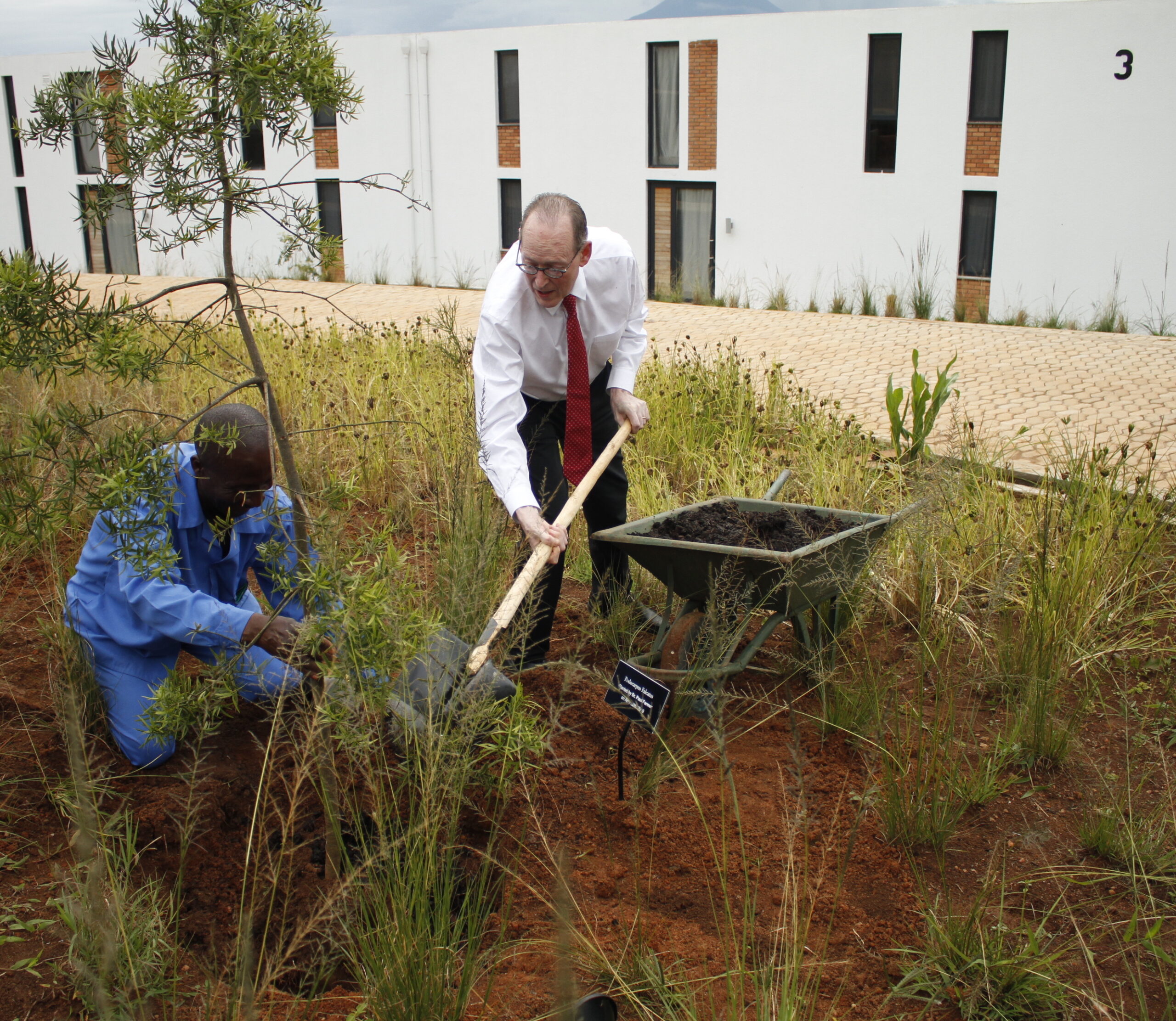
The Farmer Persona and the building of African Relationships
When Paul was with anyone, he was fully present.
Whether he was focused on a problem with an individual patient or on a global scale, whether he was trimming a flower or planting a redwood, he invested himself fully in his work. Everyone he spent time with felt important in the presence of a giant. For Paul this was not just superficial charm. Everyone was truly important. Whether embracing the President of Rwanda physically, meeting with the Vice Chancellor or the Minister for health virtually, or rubbing minds with his driver or kitchen staff, Paul exuded value for the person.
In his final months, he took time to inspire and mentor leadership both in a “Kagame” boardroom and while planting flowers in a Butaro garden. In his final weeks, he spent hours watching a Liverpool soccer match with a dying patient, even though he never truly had any love for sports. In his final days, he agonized over the loss of one patient, despite the many he had saved. I never heard him say it this way, but I totally understood the weight of Paul’s words penned by Tracy Kidder: “I can’t sleep. There’s always somebody not getting treatment. I can’t stand that.”2 University of Global Health Equity medical students enjoyed a relaxing evening of mentorship with him on the eve of his passing in discussion and fun with a global health legend.
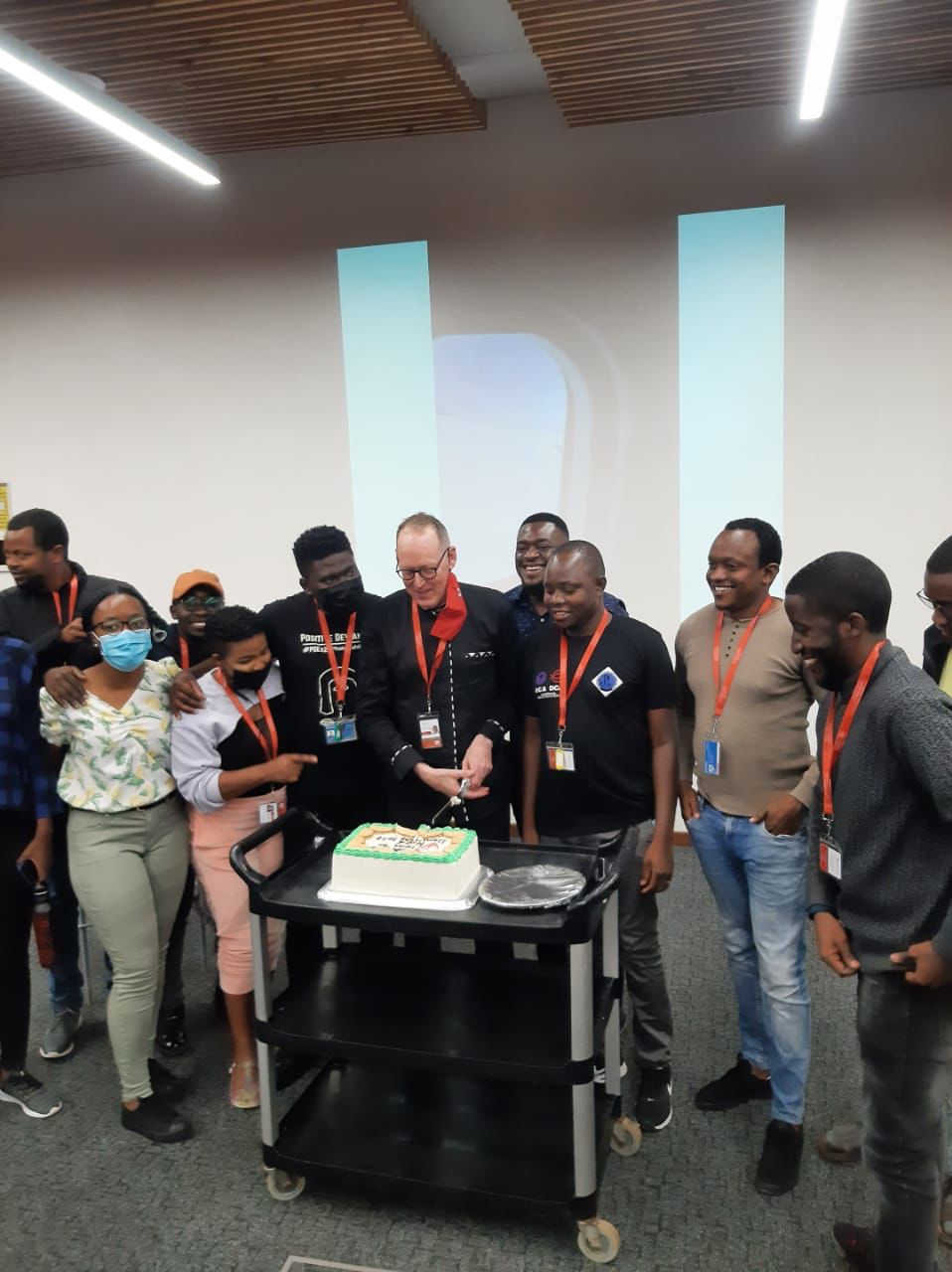
He stepped out of the physician’s comfort zone regularly for social rounds —going from bed to bed at the cancer center in rural Rwanda, exposing himself to pain; to spread joy, hope, faith, and love. He stepped out of the global health practitioner’s comfort zone — going from continent to continent and becoming African, and accompanying the poor. He even stepped out of Africa’s comfort zones — chasing health systems decimated by wars, beating back viruses, fighting for equitable policy, watering clinical deserts. His passing in Rwanda seemed to be a final expression of accompaniment.
Muganga Mwiza’s smile inspires us to carry on his commitment.
References
1. Farmer, Paul. Pathologies of Power Health, Human Rights, and the New War on the Poor: With a New Preface by the Author. Berkeley: University of California Press, 2005.
2. French, Michael, and Tracy Kidder. Mountains beyond Mountains: The Quest of Dr. Paul Farmer, a Man Who Would Cure the World. New York, New Yok: Ember, 2014.
3. Partners In Health. “Rwanda.” Partners In Health, 2020. https://www.pih.org/country/rwanda.
4. Farmer, Paul. Fevers, Feuds, and Diamonds: Ebola and the Ravages of History. New York, New York: Picador, 2021.
5. Partners In Health. “5 Unique Elements Driving Partners in Health’s Work.” Partners In Health, June 8, 2021. https://www.pih.org/article/5-unique-elements-driving-partners-healths-work.
6. Editors, Encyclopaedia Britannica. “Gustavo Gutiérrez.” Encyclopædia Britannica. Encyclopædia Britannica, inc., 2019. https://www.britannica.com/biography/Gustavo-Gutierrez.
7. Bradley, Anthony B. “Liberation Theology.” Oxford Bibliographies Online. Oxford Bibliographies, June 28, 2016. https://www.oxfordbibliographies.com/view/document/obo-9780190280024/obo-9780190280024-0019.xml. DOI: 10.1093/OBO/9780190280024-0019
8. Duncan, Maru, and Paul Farmer. “Human Rights and Health Systems Development: Confronting the Politics of Exclusion and the Economics of Inequality.” Health and human rights, 2, 14 (December 15, 2012): 1–8.
9. Farmer, Paul. Pathologies of Power Health, Human Rights, and the New War on the Poor. Berkeley, California: University of California Press, 2010.
10. Farmer, Paul. “The Major Infectious Diseases in the World — to Treat or Not to Treat?” New England Journal of Medicine 345, no. 3 (2001): 208–10. https://doi.org/10.1056/nejm200107193450310.
11. Khan, J. “Rich Nations Consider Fund of Billions to Fight AIDS.” New York Times., April 29, 2009, 6 edition. https://www.nytimes.com/2001/06/11/opinion/in-america-refusing-to-save-afric.ans.html
12. Farmer, Paul, Fernet Léandre, Joia S Mukherjee, Marie Sidonise Claude, Patrice Nevil, Mary C Smith-Fawzi, Serena P Koenig, et al. “Community-Based Approaches to HIV Treatment in Resource-Poor Settings.” The Lancet 358, no. 9279 (2001): 404–9. https://doi.org/10.1016/s0140-6736(01)05550-7.
